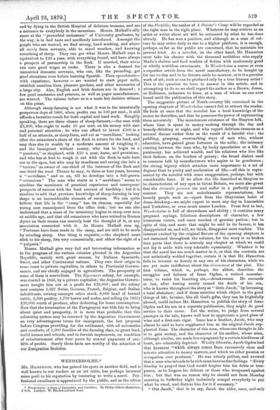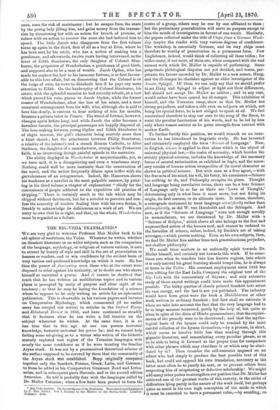WENDERHOLME.*
MR. HAMERTON, who has gained his spurs in another field, and is well known to our readers as an art critic, has perhaps incurred some peril to his reputation by venturing to write a novel. Pro- fessional excellence is appreciated by the public, and as the editor • "IVenderhohnt: a Story of Lancashire and Yorkshire. By Philip Gilbert Hamerton. 3 vols. London: W. Blackwood and Sons. of the Portfolio, the author of A Painter's Camp will be regarded as the right man in the right place. Whatever he may achieve as an
artist or writer about art will be estimated by what he has done already. Ile has won a position, and although as a man of cul- ture he may strive daily to rise to a higher platform, it is enough,
perhaps, so far as the public are concerned, that he maintain his present level. As a novelist, on the other hand, Mr. Hamden must take his chance with the thousand scribblers who supply Mudie's shelves and feed readers of fiction with moderately good or wholly worthless sweetmeats. Is Wenderholme a coarse or even a superfine article from the novel manufactory, to be bought up for use to-day and to be thrown aside to-morrow, one it a genuine work of art, such as can be produced only by a true literary artist? This is the question we have to answer in this article, and in attempting to do so we shall regard the author as a Brown, Jones, or Robinson, unknown to fame, as a man of whom no one ever heard until the publication of this story.
The suggestive picture of North-country life contained in the opening chapters of Wenderholme cannot fail to attract the reader. He feels at once that the novelist has a local knowledge of the scenes he describes, and that he possesses the power of representing them accurately. The monotonous existence of the Shayton folk, whose time is spent in money-making through the day and brandy-drinking at night, and who regard delirium-tremens as a natural disease rather than as the result of a hateful vice ; the peddling, grasping, overreaching ways of men who, without education, have gained great fortunes in the mills ; the intimacy existing between the man who, by lucky speculation or a life of parsimony, has achieved wealth, and his relatives who live like their fathers, on the borders of penury; the broad dialect used in common talk by manufacturers who aspire to be gentlemen ; the strong bigotry which attaches more importance to a set of dogmas than to purity and moderation of life,—all this is repre- sented by the novelist with some exaggeration, perhaps, but with considerable force. If we allow the life described at Shayton to be characteristic of any spot in Great Britain, we must also grant that the dramatis persons: sin and suffer in a perfectly natural manner. They are not melodramatic representations, but homely people such as—apart from the Shaytonian habit of dram-drinking—we might expect to meet any day in Lancashire and Yorkshire, or even much nearer London. From first to last, Wenderholme is full of shrewdness and ability ; it contains many pregnant sayings, felicitous descriptions of character, a few humorous scenes, and some touches of genuine pathos ; but in spite of this, and more that might be said in its favour, it has disappointed us, and will, we think, disappoint most readers. The interest excited by the original flavour of the opening chapters is not sustained throughout the volumes, for the story is so broken into parts that there is scarcely any chapter at which we could not lay it aside with very tolerable equanimity. Whether it be that the novel has too much matter in it, or that the contents are not artistically welded together, certain it is that Mr. Ilamerton fails to interest us keenly in any one of his characters, while we are yet more indifferent about the denouement of the plot. The first volume, which is, perhaps, the ablest, describes the struggles and failures of Isaac Ogden, a retired manufac- turer, to resist his besetting sin,—drunkenness. He succeeds at last, after having nearly caused the death of his son, who is known throughout the story as "little Jacob," by becoming a total abstainer ; and if those societies which object to the good things of life, because, like all God's gifts, they can be frightfully abused, could induce Mr. Hamerton to publish the story of Isaac Ogden and his son as a separate publication, they might do good service to their cause. Yet the writer, to judge from several passages in the tale, knows well how to appreciate a good glass of wine and a first-rate cigar. Isaac has a brother, Jacob, who may almost be said to have supplanted him as the original Jacob sup- planted Esau. The character of this man, whose one thought in life is to gain money, and the character of his mother, whose aims, although similar, are made less repugnant by a certain kindliness of heart, are admirably depicted. Wholly illiterate, Jacob Ogden had that keenness "which always comes from excessively close and minute attention to money matters, and which no other passion or occupation ever produces." He was utterly pitiless, and avowed that a man who intends to be rich must have no fine feelings. "Every Sunday he prayed that God would forgive him his debts or tres- passes, as he forgave his debtors or those who trespassed against him ; but that was no reason why he should not from Monday morning to Satbrday night inclusively compel everybody to pay what he owed, and distress him for it if necessary."
"Our Jacob," that is to say, Jacob the elder, once, and only once, runs the risk of matrimony ; but he escapes from the snare by the young lady jilting him, and gains money from the transac- tion by threatening her with an action for breach of promise, or rather with an action to recover the sums she had induced him to spend. The little Jacob who disappears from the first volume turns up again in the third, first of all as a boy at Eton, where he has been sent by his uncle, who has a notion of making him a gentleman, and afterwards, twelve years having intervened, as the lover of Edith Stanburne, the only daughter of Colonel Stan- barne, the proprietor of Wenderhohne, a gentleman of good birth, and supposed also to be a man of wealth. Jacob Ogden, who has made his nephew the heir to his immense fortune, is at first favour- able to this love affair, but on discovering that the Colonel is on the verge of ruin, he vows to disinherit him if he pays any more attention to Edith. On the bankruptcy of Colonel Stanburne, his estate, with the splendid mansion he had recently rebuilt, at a cost which proved his ruin, passes to Jacob Ogden, while the former master of Wenderholme, after the loss of his estate, and a most unnatural estrangement from his wife, who, although she is said to love him dearly, is content to hear nothing of him for months, becomes a private tutor in France. The wheel of fortune, however, changes again before long, and while Jacob the elder becomes a harmless lunatic, the principal personages are happily disposed of. The love-making between young Ogden and Edith Stanburne is of slight interest, the girl's character being scarcely more than a faint sketch ; but the attachment between Philip Stanburne, a relative of the colonel's and a stanch Roman Catholic, to Alice Stedman, the daughter of a manufacturer, strong in the Protestant faith, is an interesting though painful episode in the narrative.
The ability displayed in 1Venderholme is unquestionable, yet, as we have said, it is a disappointing and even a wearisome story. Nothing could well be more inartistic than the construction of the novel, and the writer frequently dilates upon trifles with the garrulousness of an octogenarian. Indeed, Mr. Hamerton shows his weakness as a novelist in the most palpable manner, by print- ing in his third volume a chapter of explanations "chiefly for the convenience of people addicted to the expeditive old practice of skipping." There is certainly much in the tale which may be skipped without detriment, but for a novelist to perceive and con- fess the necessity of readers dealing thus with his own fiction, is frankly to acknowledge its deficiencies as a work of art. We are sorry to own that he is right, and that, on the whole, Wenderholme smut be regarded as a failure.































 Previous page
Previous page